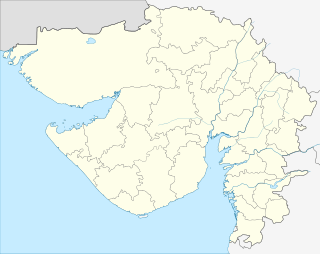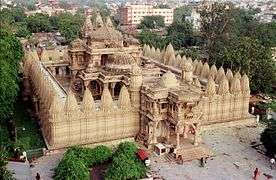Hutheesing Jain Temple
| Hutheesing Jain Temple | |
|---|---|
| |
|
Kirti Stambh, Hathisinh Temple | |
 Location within Gujarat | |
| Basic information | |
| Location | Ahmedabad, Ahmedabad district, Gujarat |
| Geographic coordinates | 23°02′28″N 72°35′23″E / 23.041088°N 72.589611°ECoordinates: 23°02′28″N 72°35′23″E / 23.041088°N 72.589611°E |
| Affiliation | Jainism |
| Deity | Dharmanath |
| Festivals | Mahavir Jayanti |
| Architectural description | |
| Creator | Premchand Salat |
| Date established | 1848 |
| Specifications | |
| Temple(s) | 1 |
| Part of a series on |
| Jainism |
|---|
 |
|
Jain prayers |
|
Ethics |
|
Major figures |
|
Major sects |
|
Festivals |
|
Pilgrimages |
|
|
Hutheesing Temple (Gujarati: હઠીસિંહનાં દેરા) is the best known Jain temple in Ahmedabad in Gujarat, India. It was constructed in 1848.[1]
History
The construction of the temple was initiated originally planned by Shet Hathisinh Kesarisinh, a wealthy Ahmedabad trader who died at 49. The construction was supervised and completed by his wife Shethani Harkunvar. The total cost was approximately Rs. 8 lakh.,[2][3] then a major sum. The temple is dedicated to Dharmanatha, the fifteenth Jain Tirthankar.
Lockwood de Forest who was a business associate of Muggenbhai Hutheesing, the son of Sheth Hathisinh, estimated the cost as "over a million dollars".[4]
The temple was built during a severe famine in Gujarat. Building the temple employed hundreds of skilled artisans which supported them for a period of two years.
The temple is managed by a Hutheesing family trust.
Architecture
The temple architect was Premchand Salat.[5]
The main building is double-storied. The moolnayak is marble image of the 15th Tirthankara, Lord Dharamnath. The main temple houses 11 deities, six in basement and five in three bay sanctuary.[2] The main shrine lies on the east and temple is covered with a big dome supported by twelve ornate pillars.[5] In addition there are 52 shrines (devakulikas), each adorned with an image of a Tirthankara. The secondary shrines form a long gallery its three sides.
The front is exquisitely ornamented by a 'dome' shaped structure.
The temple has a unique Manastambha (or column of honour) inspired by the Jain Manastambha and the Kirtistambha at Chittore in Rajasthan.
Photo Gallery
-
.jpg)
Temple circa 1880
-

Hutheesinh Temple with 52 devakulikas
-

Hutheesing Jain Temple main entrance
-

Front façade of the temple
-

Entrance in 1866
-

porch in 1866
-
Carving at Hatheesing jain temple
-
Tomb of Hatheesing jain temple
-
Famous Kirti Stambh of Hatheesing jain temple
-
Carving at Kirti Stambh
-

Stone sculpter at Hutheesigh Jain Mandir
-

Inside of Hutheesigh Jain Mandir
-

Hutheesigh Jain Mandir
-

Hathisingh Jain Mandir Kirti Stambh
See also
References
- ↑ Tourism, Gujarat. "Hutheesing Jain Temple". Retrieved 8 June 2013.
- 1 2 Pandya, Yatin (18 October 2011). "Hathisinh Jain temple: A creative realism". DNA (Daily News & Analysis). Retrieved 3 January 2011.
- ↑ Gazetteer of the Bombay Presidency: Ahmedabad. Government Central Press. 1879. p. 282.
- ↑ Handicraft, Volume 3 National League of Handicraft Societies, Wood Carving in India. Lockwood De Forest. Handicraft Publishing Company, 1911
- 1 2 "Hathisinh Jain Temple". Gujarat Tourism. 22 September 2009. Retrieved 3 January 2012.
| Wikimedia Commons has media related to Hutheesing Jain Temple. |